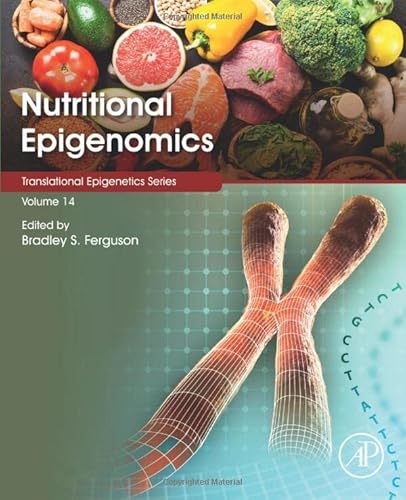Items related to Nutritional Epigenomics (Volume 14) (Translational...

Nutritional Epigenomics offers a comprehensive overview of nutritional epigenomics as a mode of study, along with nutrition’s role in the epigenomic regulation of disease, health and developmental processes. Here, an expert team of international contributors introduces readers to nutritional epigenomic regulators of gene expression, our diet’s role in epigenomic regulation of disease and disease inheritance, caloric restriction and exercise as they relate to recent epigenomic findings, and the influence of nutritional epigenomics over circadian rhythms, aging and longevity, and fetal health and development, among other processes. Disease specific chapters address metabolic disease (obesity and diabetes), cancer, and neurodegeneration, among other disorders.
Diet-gut microbiome interactions in the epigenomic regulation of disease are also discussed, as is the role of micronutrients and milk miRNAs in epigenetic regulation. Finally, chapter authors examine ongoing discussions of race and ethnicity in the social-epigenomic regulation of health and disease.
- Empowers the reader to employ nutritional epigenomics approaches in their own research
- Discusses the latest topics in nutritional epigenomics in the regulation of aging, circadian rhythm, inheritance and fetal development, as well as metabolism and disease
- Offers a full grounding in epigenetic reprogramming and nutritional intervention in the treatment and prevention of disease, as informed by population-based studies
"synopsis" may belong to another edition of this title.
Over the last decade, interest in diet-gene interactions has led researchers to examine epigenomic reprogramming and nutritional intervention in the treatment and prevention of disease. These studies, in part assisted with technological advances in epigenomic sequencing, have increased our understanding of diet’s influence over epigenetic regulation in aging, fetal growth and development, transgenerational inheritance, and circadian rhythm, in addition to health and disease.
Nutritional Epigenomics offers a comprehensive overview of nutritional epigenomics as a mode of study, and current understanding of nutrition’s role in epigenomic regulation of disease, health, and developmental processes. Here, an expert team of international contributors introduces readers to nutritional epigenomic regulators of gene expression, our diet’s role in epigenomic regulation of disease and disease inheritance, caloric restriction and exercise as they relate to recent epigenomic findings, and the influence of nutritional epigenomics over circadian rhythms, aging and longevity, and fetal health and development among other processes. Disease specific chapters address metabolic disease (obesity and diabetes), cancer, and neurodegeneration among other disorders. Diet-gut microbiome interactions in the epigenomic regulation of disease are discussed as well, as are the role of micronutrients and milk miRNAs in epigenetic regulation. Finally, chapter authors also examine ongoing discussions of race and ethnicity in the social-epigenomic regulation of health and disease.
Throughout Nutritional Epigenomics, close attention is paid not only to recent findings of translational significance, but epigenomic approaches, technologies, and modes of analysis to enable future epigenomic studies
"About this title" may belong to another edition of this title.
- PublisherAcademic Press
- Publication date2019
- ISBN 10 0128168439
- ISBN 13 9780128168431
- BindingPaperback
- Edition number1
- Number of pages478
- EditorFerguson Bradley S.
Buy New
Learn more about this copy
Shipping:
US$ 12.07
From Italy to U.S.A.
Top Search Results from the AbeBooks Marketplace
Nutritional Epigenomics (Volume 14) (Translational Epigenetics, Volume 14)
Book Description Condition: new. Questo è un articolo print on demand. Seller Inventory # 22ac3236924b72f24271c4acf13d414d
Nutritional Epigenomics (Volume 14) (Translational Epigenetics (Volume 14))
Book Description Paperback. Condition: Brand New. 488 pages. 9.25x7.50x1.22 inches. In Stock. Seller Inventory # __0128168439

